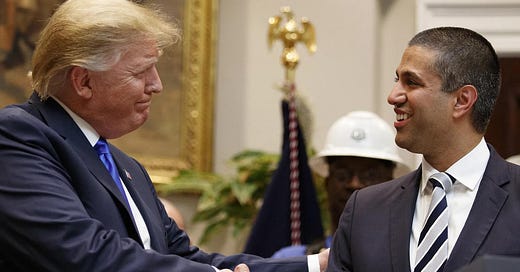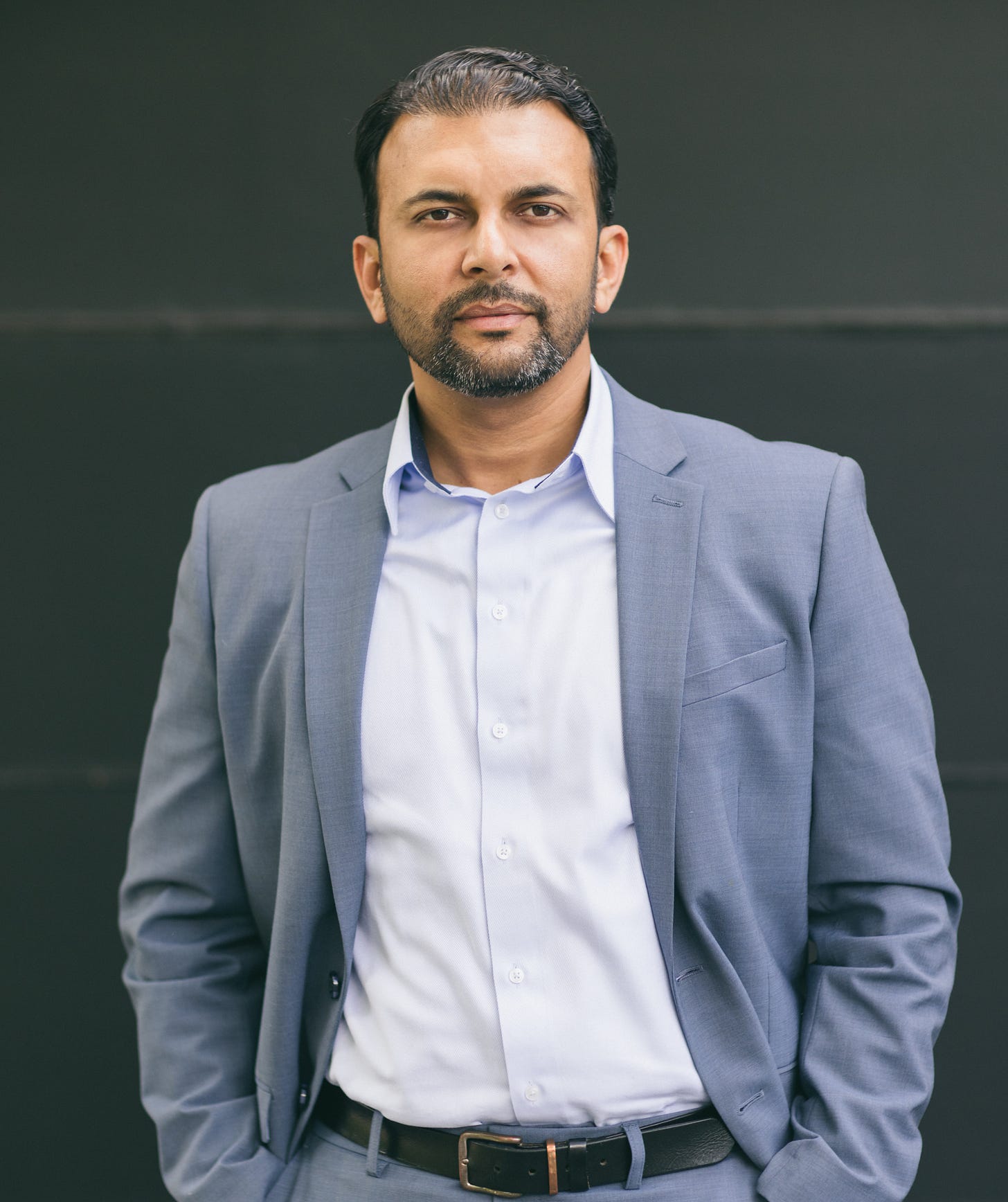We Cannot Ignore the War on Free & Fair Internet
Ajit Pai is back, and with him a wave of corruption that could undermine free speech for all of us—yet corporate media continues to ignore it
There’s a war on a free and fair Internet, and if we lose this battle, we effectively lose our free speech rights forever. This isn’t hyperbole, it’s one of the biggest stories corporate media is largely ignoring.
Poke around Trump’s first term and you’ll come across the name Ajit Pai. If that name sounds even vaguely familiar, it’s because Pai was the Trump appointed FCC Chair who helped Trump kill net neutrality, gut protections for low-income broadband users, and weaponize the FCC against free expression.
Now Pai’s back—not to fix the damage he caused—but to profit from it.
This is the result of a deeply broken system that allows public officials to dismantle consumer protections, reward corporate monopolies, and then walk straight into high-paying jobs with the same industries they just deregulated.
If that feels like horrific corruption, it should. But in today’s political climate, it barely registers. Here’s what you need to know and what’s at stake. Let’s Address This.
The Net Neutrality Fight We Lost
In America, power doesn’t just corrupt. Too often, it cashes in. It’s no surprise, therefore, that Donald Trump’s former FCC Chairman Ajit Pai is back in the spotlight as the new President and CEO of CTIA, the top lobbying group for the wireless industry.
But let’s take a quick step back to understand how we got here.
Remember net neutrality? The idea that your internet provider should not control what websites you access, how fast they load, or how much you pay to reach them?
Ajit Pai repealed those protections in 2017. He ignored overwhelming public opposition and sided with telecom giants like AT&T and Verizon. Even worse, the courts upheld his decision. The predictable result has been higher prices, throttled speeds, and fewer consumer protections. Corporate gatekeepers now decide what we see, how fast we see it, and how much it costs.
This isn’t democracy, it’s a road paved towards dictatorship.
Net neutrality was about fairness, free expression, and opportunity. Pai threw all that away. And now, as head of the wireless industry’s top lobbying group, he is positioned to make sure those protections never return.
Pai’s War on Free Speech & Marginalized People
Pai used his power as FCC chair to target free speech, immigrants, already marginalized communities, and waste taxpayer dollars meant to expand broadband access. Here’s how:
Gutting Free Speech: In 2020, Pai aligned the FCC with Trump’s political agenda by attacking something called Section 230. This is the part of the law that protects online platforms from being held liable for what users post. That law is a pillar of free speech on the internet. But Pai tried to reinterpret it through FCC rulemaking, setting the stage for government control over digital content.
Anti-Immigrant Hysteria: That playbook is alive and well in Trump’s second campaign. What Pai started could become the legal foundation of a future censorship regime, one that punishes dissent while claiming to protect free speech. In fact, we’re already seeing numerous examples of the Trump regime abducting and disappearing immigrants, green card holders, even U.S. citizens for their “crime” of criticizing the Trump presidency online. Thus, unsurprisingly, Pai is profiting from anti-Immigrant hysteria. After leaving office, Pai joined Searchlight Capital, a private equity firm known for cutting jobs and squeezing communities. One of Searchlight’s major investments: TelevisaUnivision. That same Univision recently ran Trump-era DHS deportation ads targeting Latino audiences. Immigrant rights groups condemned the ads as fear-mongering. Pai said nothing. But silence, especially from someone in power, is a statement. And in this case, it says the check cleared to justify targeting already vulnerable communities.
Targeting Low Income Communities: And speaking of the most vulnerable, Pai also tried to gut the Lifeline program, which helps low-income families, seniors, and veterans afford broadband and phone service. At a time when access to the internet is essential for school, work, and health care, Pai treated it like a luxury. The digital divide did not happen by accident. It was created by decisions like these.
Taxpayer Dollars Wasted: Pai oversaw the 9.2 billion dollar Rural Digital Opportunity Fund, designed to bring high-speed internet to underserved communities. Instead, the money went to unqualified providers. Projects stalled. Communities that were promised broadband got nothing but paperwork and delays. The Biden administration had to pause the program just to stop the damage.
As you hear Musk’s so-called “DOGE” claim they’re making government more efficient, you’ll notice Pai’s immense waste at the FCC escapes their list. This is how billionaires and corporations are protecting themselves while robbing the American people. Thus, Ajit Pai is not an outlier. He is part of a larger pattern.
A pattern of consolidation of power between big corporations and government that has erased the line between public service and private enrichment.
It is the same playbook Elon Musk is now using: Billionaires reshaping federal policy in real time, without transparency or accountability, to deregulate agencies who hold them accountable, eliminate competition and opposition, and privatize control over public entities like the Internet, USPS, and Social Security.
Here’s the bottom line: This is not about Democrat or Republican. Conservative or Liberal. It is about power and the consolidation of it amongst a select few, and usurping the rights of the many. Who gets power, who keeps it, and who pays the price. This is where we must stand united as Americans to stop this injustice—because autocracy is a one way street we cannot afford to travel down.
What’s Next?
The bottom line is that we must stop pretending people like Ajit Pai are neutral bureaucrats. They are political actors. And their actions have real consequences for real people, especially those already pushed to the margins.
Yet, if you google the name Ajit Pai, aside from a press release announcing his new role as CTIA’s new CEO, there’s zero mention of him in corporate media. No mention of his apparent self-dealing, no mention of his destructive deregulations, no mention of his targeting of already marginalized communities. Not one single article in 2025.
This apathy is nothing short of journalistic malpractice.
So let’s call this what it is: regulatory corruption hiding in plain sight.
This is why it is critical we remain informed of this corruption, and use that knowledge to instead push for policies that protect people, not profits. That protects free speech, not throttles access. Pai is back to target our rights and to further undermine already marginalized communities. Except now he has even more money, even more power, and even fewer constraints.
The fight for a free, open, and affordable internet is not over, but corporate media is sadly already throwing in the towel. We cannot afford to lose this fight. That’s why as a human rights lawyer I follow these developments closely—because our rights matter. You can count on me to continue to elevate these critical realities, especially because billionaire owned media hasn’t and won’t.
Keep your eye on Pai, and watch this space closely as I will continue to update you on these overt attacks on our free speech rights.






I vaguely remember the "net neutrality" stuff from Trump's first term. Thanks Qasim, for updating us on Ajit Pai - another dubious grifter in the Trump Regime.
The real power of a voice is not measured by its volume but by what it says.
And you are saying what needs to be said.
Thank you.